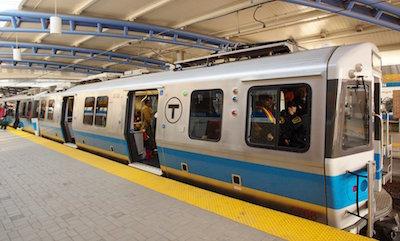The Massachusetts Bay Transportation Authority (MBTA) has announced a series of public hearings to discuss proposed fare increases across its commuter rail, light rail, and subway services. The fare hike proposals, aimed at addressing budget shortfalls and funding system improvements, have sparked important public interest and debate. Officials encourage riders and community members to participate in the hearings to voice their opinions and concerns before any changes are implemented.
Table of Contents
- Public Engagement Opportunities and Community Concerns
- Analyzing the Impact of Fare Increases on Low-Income Riders
- MBTA Officials Outline Justifications for Proposed Hikes
- Recommendations for Equitable Solutions and Alternative Funding Strategies
- The Way Forward
Public Engagement Opportunities and Community Concerns
The MBTA has opened several channels for public participation as it navigates the proposed fare increase,emphasizing the importance of community input.Residents and daily riders are invited to attend a series of public hearings scheduled over the coming weeks,designed to provide a platform for voicing concerns,asking questions,and discussing the potential impacts. These sessions will be complemented by an online comment portal,ensuring that even those unable to attend in person can contribute their perspectives.Key opportunities include:
- In-person public hearings across multiple neighborhoods
- Virtual Q&A sessions with MBTA officials
- Dedicated online feedback forms available through the MBTA Advisory Board website
- Community roundtables with transit advocates and city planners
Community concerns have ranged from the financial strain on low-income riders to fears of reduced transit accessibility. Advocacy groups stress the necessity of equitable fare policies that do not disproportionately burden vulnerable populations. Additionally, passengers express apprehension about fare enforcement tightening simultaneously, which could penalize those struggling with the current fare system. The MBTA has pledged to carefully review all public feedback before finalizing any fare adjustments, recognizing the critical need to balance system sustainability with community equity.
Analyzing the Impact of Fare Increases on Low-Income Riders
The proposed fare increase by the MBTA poses significant challenges for low-income riders who rely heavily on public transit for daily commutes, access to jobs, healthcare, and essential services. For many, even a modest rise in fares translates to a tangible cut in their already tight budgets, exacerbating economic hardships. Advocates warn that fare hikes could lead to reduced ridership among vulnerable populations, perhaps limiting their mobility and deepening social inequalities.
Key concerns include:
- Increased financial strain: Additional transit costs may force families to sacrifice other necessities such as food, utilities, or education.
- Reduced access to employment: Higher fares could disproportionately impact workers in low-wage jobs who depend on MBTA services for commuting.
- Potential rise in transit deserts: Communities with fewer alternative transportation options risk becoming further isolated.
Public officials and stakeholders are urged to consider equitable fare policies, including targeted subsidies or expanded low-income fare programs, to mitigate these impacts while balancing the need to maintain the system’s financial sustainability.
MBTA Officials Outline Justifications for Proposed Hikes
MBTA officials emphasize that the proposed fare increases are critical to sustaining and improving the transit system’s infrastructure and services. They argue that without additional revenue, necessary upgrades to aging equipment and stations could face significant delays, potentially impacting safety and reliability.The agency highlighted escalating operational costs, including rising fuel prices and increased maintenance expenses, as key factors driving the need for fare adjustments.
Officials outlined several targeted goals that the fare hikes would help address, such as:
- Funding essential maintenance and modernization projects to extend the lifespan of existing railcars and buses
- Enhancing service frequency and reducing delays to better accommodate growing ridership demands
- Complying with updated federal safety and accessibility regulations to ensure equitable transit access
By adjusting fare structures, MBTA leadership asserts they aim to strike a balance between financial sustainability and maintaining affordable access for the millions who rely on public transportation daily.
Recommendations for Equitable Solutions and Alternative Funding Strategies
Community advocates stress the importance of crafting solutions that prioritize fairness and accessibility. Among the proposed measures are income-based fare discounts and expanded eligibility for subsidized transit passes. These steps aim to ensure that low-income riders are not disproportionately impacted by fare increases. Additionally, experts underscore the value of investing in improved service frequency and reliability, which can offset the burden of higher costs by enhancing transit convenience and reducing reliance on private vehicles.
To diversify funding streams and lessen the reliance on fare revenues, stakeholders recommend exploring alternative mechanisms including:
- Congestion pricing zones around downtown Boston
- Targeted sales taxes benefiting public transportation
- Public-private partnerships to unlock new capital for infrastructure improvements
- State and federal earmarks dedicated to enduring transit funding
These strategies are seen not only as ways to close budget gaps but also to promote equitable access and long-term transit resilience.
The Way Forward
Public hearings on the proposed MBTA fare hikes are scheduled to provide riders and community members an possibility to voice their opinions and concerns. As the authority weighs the impact of these adjustments on service and accessibility, public input will play a crucial role in shaping the final decisions. Stakeholders are encouraged to participate actively in the process to ensure that fare policies reflect the needs of the diverse riding public. Further updates on the hearings and related developments will be reported as the situation evolves.

